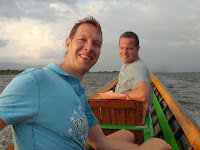the rohingya are back in the news and people often ask me about it. about the shaming of Aung San Suu Kyi over her lack of action on the horrible human rights violations taking place.
when i see reports that some country or organization is going to pull an award Aung San Suu Kyi has been given [but probably never asked for] it shocks me that they understand so little about the country and its politics.
here's what i wish people knew - there are effectively three centers of political power in Myanmar. first, the military retains enormous power [economic control and 25% of the parliment seats]; second, the democratically elected NLD [National League for Democray] of which Aung San Suu Kyi is a leader; and third, the MONKS.
it is not a secret that the 'buddhist' MONKS are responsible for poisoning the Myanmar citizens against the rohingya and are the root cause of the genocide. so, Aung San Suu Kyi has few and perhaps even no options when it comes to the rohingya.
this article on cnn gets it right
http://edition.cnn.com/2017/11/25/asia/myanmar-buddhist-nationalism-mabatha/index.html
the situation has been bad, is bad and is unlikely to get any better or to have a happy ending. the rohingya are basically illegal immigrants but before anyone vocalizes opinions on this it would be prudent for them to look at how their country treats illegal immigrants.
my previous post in 2015 about the rohingya.
another more happy post can be done about Zimbabwe!
when i see reports that some country or organization is going to pull an award Aung San Suu Kyi has been given [but probably never asked for] it shocks me that they understand so little about the country and its politics.
here's what i wish people knew - there are effectively three centers of political power in Myanmar. first, the military retains enormous power [economic control and 25% of the parliment seats]; second, the democratically elected NLD [National League for Democray] of which Aung San Suu Kyi is a leader; and third, the MONKS.
it is not a secret that the 'buddhist' MONKS are responsible for poisoning the Myanmar citizens against the rohingya and are the root cause of the genocide. so, Aung San Suu Kyi has few and perhaps even no options when it comes to the rohingya.
this article on cnn gets it right
http://edition.cnn.com/2017/11/25/asia/myanmar-buddhist-nationalism-mabatha/index.html
the situation has been bad, is bad and is unlikely to get any better or to have a happy ending. the rohingya are basically illegal immigrants but before anyone vocalizes opinions on this it would be prudent for them to look at how their country treats illegal immigrants.
my previous post in 2015 about the rohingya.
another more happy post can be done about Zimbabwe!



























.jpg)






















